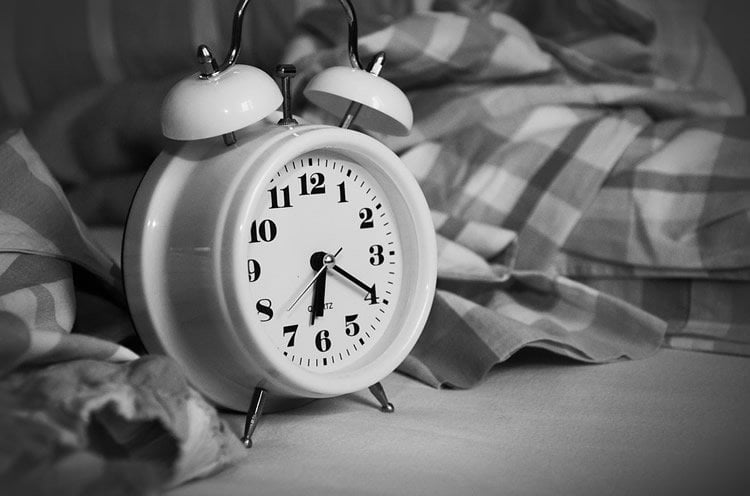Summary: Sleep deprivation appears to be more detrimental to working memory in females, a new study reports.
Source: Uppsala University.
Over the last few decades, a wealth of evidence has accumulated to suggest that a lack of sleep is bad for mind and body. Working memory is important for keeping things in mind for briefer periods of time, which thereby facilitates reasoning and planning. A team of sleep scientists from Uppsala University now demonstrates that acute sleep loss impacts working memory differently in women and men.
In the current study from the Department of Neuroscience at Uppsala University, 24 young adults performed a working memory task in the morning following either a full night of sleep or a night of wakefulness. Half of the participants were females, and half were males. The set-up of the working memory task was to learn and remember 8-digit sequences. Contrary to expectations, males’ working memory performance remained unaffected by sleep loss. In contrast, females remembered fewer digits after sleep loss than after a night of sleep. Importantly, even though their performance was reduced, females were unaware of the drop in working performance when sleep-deprived. A lack of awareness of impaired mental performance could increase the risk of accidents and mistakes, which can be dangerous in many private and occupational situations, both for the sleep-deprived person as well as for others.

“Our study suggests that particular attention should be paid to young women facing challenges in which they have to cope with both a high working memory load and a lack of sleep. However, it must be kept in mind that we have not tested whether the observed sex-dependent effects of sleep loss on working memory during morning hours would also occur at other time points of the day. In addition, while our data suggest that sleep loss impairs working memory in a sex-dependent manner, this does not mean that the sex-differences we observed can be generalised to other mental or physical measures of how we are affected by sleep loss,” says Frida Rångtell, PhD student at the Department of Neuroscience and lead author of the study.
Source: Uppsala University
Publisher: Organized by NeuroscienceNews.com.
Image Source: NeuroscienceNews.com image is credited to The Ohio State University Wexner Medical Center.
Original Research: Open access research in Journal of Sleep Research.
doi:10.1111/jsr.12651
[cbtabs][cbtab title=”MLA”]Uppsala University “Pulling an All-Nighter Impairs Working Memory in Women.” NeuroscienceNews. NeuroscienceNews, 31 January 2018.
<https://neurosciencenews.com/women-working-memory-all-nighter-8409/>.[/cbtab][cbtab title=”APA”]Uppsala University (2018, January 31). Pulling an All-Nighter Impairs Working Memory in Women. NeuroscienceNews. Retrieved January 31, 2018 from https://neurosciencenews.com/women-working-memory-all-nighter-8409/[/cbtab][cbtab title=”Chicago”]Uppsala University “Pulling an All-Nighter Impairs Working Memory in Women.” https://neurosciencenews.com/women-working-memory-all-nighter-8409/ (accessed January 31, 2018).[/cbtab][/cbtabs]
Abstract
A single night of sleep loss impairs objective but not subjective working memory performance in a sex-dependent manner
Acute sleep deprivation can lead to judgement errors and thereby increases the risk of accidents, possibly due to an impaired working memory. However, whether the adverse effects of acute sleep loss on working memory are modulated by auditory distraction in women and men are not known. Additionally, it is unknown whether sleep loss alters the way in which men and women perceive their working memory performance. Thus, 24 young adults (12 women using oral contraceptives at the time of investigation) participated in two experimental conditions: nocturnal sleep (scheduled between 22:30 and 06:30 hours) versus one night of total sleep loss. Participants were administered a digital working memory test in which eight-digit sequences were learned and retrieved in the morning after each condition. Learning of digital sequences was accompanied by either silence or auditory distraction (equal distribution among trials). After sequence retrieval, each trial ended with a question regarding how certain participants were of the correctness of their response, as a self-estimate of working memory performance. We found that sleep loss impaired objective but not self-estimated working memory performance in women. In contrast, both measures remained unaffected by sleep loss in men. Auditory distraction impaired working memory performance, without modulation by sleep loss or sex. Being unaware of cognitive limitations when sleep-deprived, as seen in our study, could lead to undesirable consequences in, for example, an occupational context. Our findings suggest that sleep-deprived young women are at particular risk for overestimating their working memory performance.






